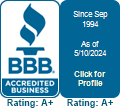End-of-Year Moving Expenses Checklist
Santa’s making a list… and he’s checking it several times to ensure the numbers are accurate. No, we’re not talking about toys for good boys and girls; we’re talking about taxes!
You might not be thinking about taxes in December—the tax deadline is in April, after all—but it’s the perfect time to make sure you’ve accounted for all your moving expenses this year, whether related to time, distance or something else. Let’s take a look at your end-of-year moving expenses checklist.
Meeting the Qualifications
For starters, you have to qualify for moving expenses to write them off on your taxes. Your move must have been related to work for you to qualify. You also must use IRS Form 3903 to claim the cost of your moving expenses as a deduction on your federal income tax return. Finally, you have to meet the minimum requirements when it comes to time and distance.
According to TurboTax, “the timing of your move must be closely related to the start of your new employment in order to qualify for the tax deduction. To meet this standard, you’ll have to start your new job and work full-time for at least 39 weeks within the first 12 months after your move.” (The only exception is if you start a new job months before your family moves to a new location because of special circumstances, such as a child finishing school.)
As for distance, TurboTax also points out that “to claim your moving costs, your new place of employment must be at least 50 miles farther away from your old home than your old place of employment.” So if your old home was 10 miles from your old job, you need a new job at least 60 miles from your old home.
Expenses Checklist
Assuming you meet the qualifications required to write off moving expenses on your taxes, what expenses can you write off? The IRS states these must be “reasonable and necessary to your move.” There is an option to adopt the standard mileage rate that the IRS provides, but if you prefer, you can keep up with costs yourself. These expenses include:
- Cost of gas used in your vehicle during the move
- Number of miles put on your vehicle during the move
- Rental truck fees, if you used one
- Professional moving service fees, if you hire a residential mover
- Storage costs, for short-term storage used during the move
- Box and packing supply fees, again, assuming they’re reasonable and necessary
- Other fees, such as parking, tolls, oil and so forth
If you need help with (or have questions about) anything related to moving and storage, give the IMS Relocation team a call today at 972-484-2112.


